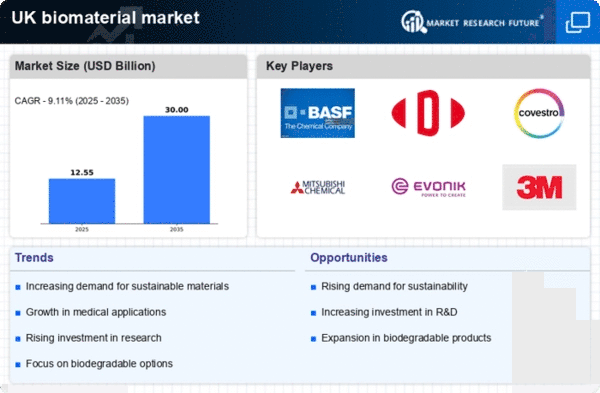Government Initiatives and Funding
Government initiatives aimed at promoting sustainable practices are playing a crucial role in the growth of the biomaterial market in the UK. Various funding programs and grants are available to support research and development in biomaterials, encouraging innovation and collaboration between academia and industry. The UK government has allocated significant resources to foster advancements in green technologies, which includes biomaterials. This support is expected to enhance the competitiveness of the biomaterial market, as companies leverage public funding to develop new products and processes. The emphasis on reducing carbon footprints and promoting circular economy principles is likely to further stimulate investment in the biomaterial sector.
Rising Demand for Eco-Friendly Products
The increasing consumer awareness regarding environmental sustainability is driving the biomaterial market in the UK. As individuals and businesses seek alternatives to traditional materials, the demand for eco-friendly products is surging. This shift is reflected in the biomaterial market, where the market size is projected to reach approximately £1.5 billion by 2026. Companies are investing in research and development to create innovative biomaterials that align with consumer preferences for sustainability. The trend towards biodegradable and renewable materials is likely to continue, influencing purchasing decisions across various sectors, including packaging, textiles, and construction. As a result, the biomaterial market is expected to experience robust growth, with eco-conscious consumers playing a pivotal role in shaping market dynamics.
Collaboration Between Industries and Academia
Collaboration between industries and academic institutions is emerging as a key driver for the biomaterial market in the UK. Such partnerships facilitate knowledge transfer and innovation, enabling the development of advanced biomaterials tailored to specific applications. Universities and research institutions are increasingly engaging with businesses to address challenges in material development and sustainability. This collaborative approach is expected to enhance the competitiveness of the biomaterial market, as new ideas and technologies are brought to fruition. The synergy between academic research and industrial application is likely to accelerate the commercialization of innovative biomaterials, fostering growth and diversification within the market.
Technological Advancements in Material Science
Technological innovations in material science are significantly impacting the biomaterial market in the UK. Advances in processing techniques and the development of new biomaterials are enhancing the performance and applicability of these materials. For instance, the introduction of 3D printing technology has enabled the production of complex biomaterial structures, which are increasingly used in medical applications and tissue engineering. The market is anticipated to grow at a CAGR of around 12% over the next five years, driven by these technological advancements. Furthermore, the integration of smart materials that respond to environmental stimuli is likely to open new avenues for the biomaterial market, expanding its reach into sectors such as electronics and automotive.
Increasing Applications in the Packaging Industry
The packaging industry is witnessing a notable shift towards the adoption of biomaterials, which is driving the biomaterial market in the UK. With growing concerns over plastic waste and environmental impact, companies are increasingly seeking sustainable packaging solutions. Biomaterials offer a viable alternative, as they can be designed to be biodegradable or compostable. The market for biomaterials in packaging is projected to grow significantly, with estimates suggesting a potential increase of 15% annually over the next few years. This trend is likely to encourage manufacturers to invest in biomaterial research and development, thereby expanding the overall biomaterial market. As consumer preferences evolve, the demand for sustainable packaging solutions will continue to shape market dynamics.
















